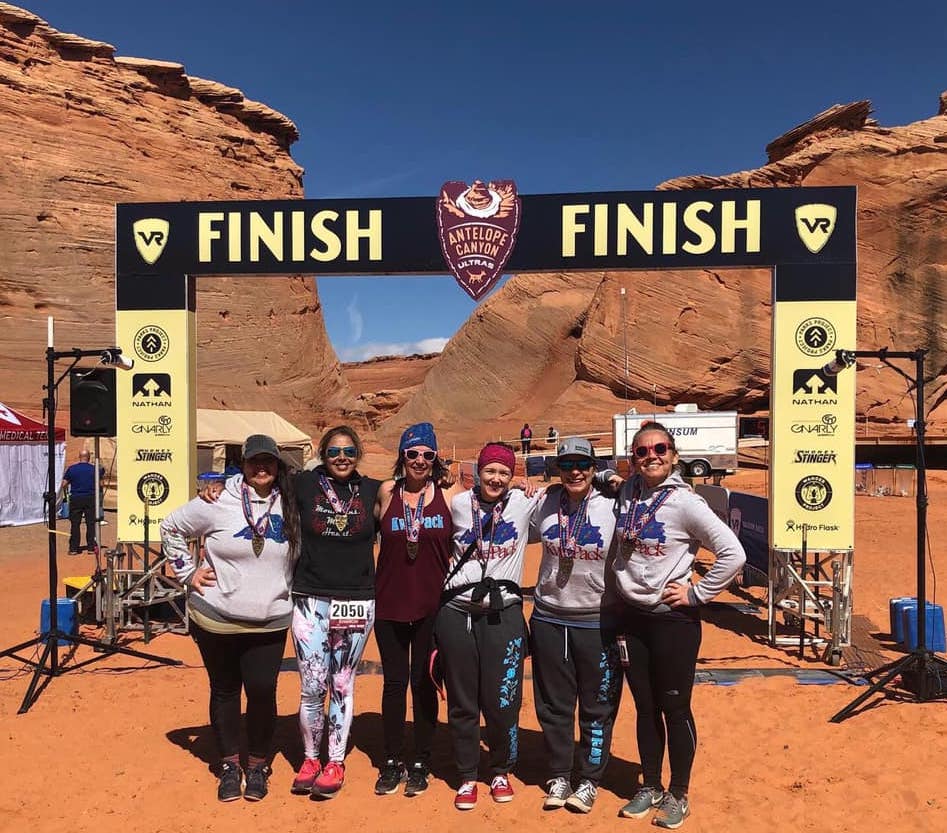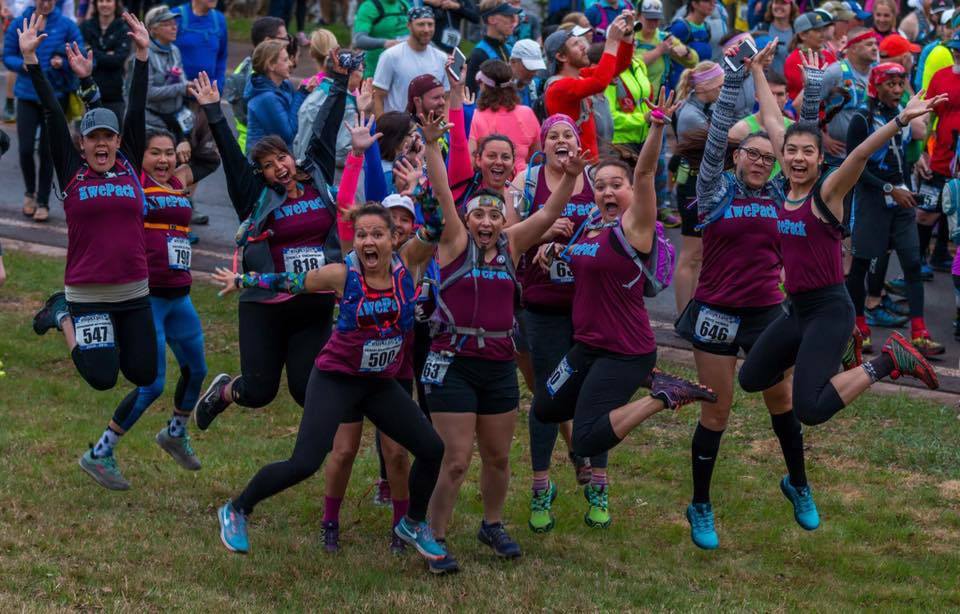
(Photo: Courtesy of the Kwe Pack)
A group of Native women runners changed my life this February. Just before I gave a reading at Fond du Lac Tribal College in Cloquet, Minnesota, four Anishinaabe women—known as the Kwe Pack—stood before the audience to talk about how they have collectively taken on five- to 50-kilometer runs, taught their children to run alongside them, and broken cycles of unhealthy behaviors along the way. They also spoke about having liberated themselves from the limitations they’d previously thought were constraining them or their bodies.
These women reshaped the way I looked at my own body that day: Their lived values made me see each indigenous woman as a body of hope for herself and her nieces, her children, her community, instead of seeing only the statistics we face, and the odds against us.
The women of the Kwe Pack had their own language. They used words such as “heart-way” to talk about the path they’ve chosen for themselves, no matter how hard; they talked about the “relentless support” they give each other; and instead of talking in negative terms about the disparities indigenous people face, they spoke in forward-thinking terms: They had “battles to win.”
Given the average Native woman’s struggles, and how we so often put ourselves last, the Kwe Pack’s optimism and fierce self-compassion feel transformative.
Anishinaabe artist Sarah Agaton Howes, a Kwe Pack organizer (or “run-stalker”) for the past seven years, says, “What began as a few isolated women running became the largest indigenous running group in the Midwest.” The group’s first big race together was the Superior Trail 25k in Lutsen, Minnesota, in 2010. It’s the kind of race Howes says will make or break you.
“One layer is that we need to know we are free. Being sedentary and sick as Native people is genocide. The reservation system was always meant to be a trap. And being too afraid to go outside and move our bodies is killing us. Running is freedom for many of us. We also know, though, that being out in the woods or on roads is dangerous, especially for us Native women.”
As indigenous women, we know some of the statistics. According to the National Congress of American Indians, more than four in five American Indian and Alaska Native women have experienced violence in their lifetime, and more than half have experienced sexual violence. The way the women of the Kwe Pack have found peace with each other seems like part of an answer to the question of how we can live fully, even with these threats against us looming all the time.
Howes says that she started her path to healing when she weighed 200 pounds, and after she’d lost her daughter Mahali. She says the grief nearly destroyed her. “I had died,” she says. She started jogging and did Weight Watchers, pursued strength training, and lost 80 pounds while finding her way to “ceremony”; that is to say, she discovered that healing herself also connected her to generations of people in her story as an Anishinaabe woman. She found a path into community organizing, art, and running—a heart-way toward which she guided herself.
“Do your heart-way even if no one else is coming,” Howes says. “Be brave, be bold, do not let anyone make you invisible. We belong in every space and every place.”
These words resonated with me. Since the day when the Kwe Pack introduced themselves and showed me the importance of being active and caring for myself and my heart-way a little better, I’ve lost 12 pounds. It’s been as simple as envisioning a better path for myself, and seeing a future without high cholesterol, where I’m here with my babies for a bit longer on this Earth.

As I was working on my body and my heart-ways in the weeks since we met, members of the Kwe Pack ran the Antelope Canyon Half Marathon in Arizona and are gearing up for the next Superior Spring 25k. Melissa Walls, another member, is keen to emphasize the miracle that Kwe Pack has brought about:
We have switched something massive in just one generation. Now, let me tell you something: I am a social scientist and my entire work life is about promoting health in partnership with our tribal communities. I know on a scientific and real-life level how hard it is to change social norms. People spend millions of dollars on research and programs and ideas to try to make norms change—this is not easy work. So, it is nothing short of miraculous to see those norms totally flipped in my own life and family because of this indigenous women’s running group. And it ripples out: Communities are watching, and the image of a running Native woman is no longer an oddity, I hope. It is something brave, fierce, beautiful, strong.
Walls says she joined after she saw a Kwe Pack runner at a local marathon in 2013, where she stood watching alongside her family members.
“Three generations connected on the side of the road next to me, and the Kwe Pack runner kissed her son and was crying,” Walls says. “He asked her, ‘Mom, why are you crying?’ and she said, ‘Because it hurts, but I’m going to do it.'”
Walls was so inspired that she joined—after first training and learning to run a 5k on her own. “It took months for me to make it to three miles, and it hurt. It was actually an entire year before I felt brave enough to show up at a Kwe Pack run. I was welcomed, I was scared, and we did it.”

(Photo: Courtesy of the Kwe Pack)
Another member, Alicia Kozlowski, who was recently appointed as Duluth’s community relations officer—a liaison between the mayor’s office and city departments and other governmental agencies and community organizations—shares a similar story of empowerment: “This group is comprised of incredibly resilient and strong women—there are lawyers, educators, social workers, professional artists, mothers, and public servants. We are all leaders, with gifts to share in our own ways. We are becoming the new ancestors.”
These heartening stories keep rolling in. Chally Topping started running with Kwepack as a smoker who weighed 256 pounds and suffered with bad anxiety. She decided to try running the length of a single block. Then she tried another. Eventually she was running miles and losing weight. She didn’t know anyone else her age who ran, and then she found the Kwe Pack. She did her first big run with group, the Moose Mountain 25k, in 2013.
Shelbie Shelder, a newer member in the Kwe Pack, says:
When I was making the decision on where to go to medical school, I prayed a lot. I wanted to make the best decision for my education and my well-being. I asked Creator to send me to a place that would provide for my community and nourish my soul as an Anishinaabe woman. It wasn’t until recently that this whole decision came full circle. I soon realized that I have needed these women in some of my darkest times in medical school. I truly believe that I am exactly where I am supposed to be, which is near these empowering, strong, resilient Anishinaabe women.
The future for these women is bright, and it’s lighting the way for more every day. Patricia Staine describes the group’s goals:
I often tell people that I run to fight diabetes. I run for my mother and my grandmothers. I run for my father and my grandfathers. I run for my husband and my children. I run to stay sane and I run to let loose. I run to process my stress and I run for fun. In the end, I run for me. But it isn’t just for me, if that makes any sense.
When women come together to form safer communities, it feels like we can finally—remarkably—break these cycles of violence and erasure. Yet “revolution” feels too much like a white word that doesn’t quite capture the important work the Kwe Pack is doing. When I think about a revolution, I see egos and pitfalls and discord, but when I see these women, I believe we can envision a future where healing and success are within reach, for us and for future generations.

Pacific Standard’s Ideas section is your destination for idea-driven features, voracious culture coverage, sharp opinion, and enlightening conversation. Help us shape our ongoing coverage by responding to a short reader survey.





